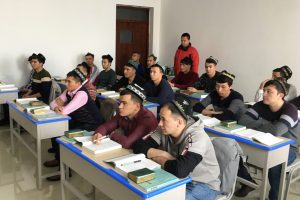
By Stephanie Nebehay
GENEVA (Reuters) – Rights activists urged European and Muslim nations on Monday to take the lead in establishing a U.N. investigation into China’s detention and what they call its “forced indoctrination” of up to one million Uighurs and other Muslims in Xinjiang province.
Beijing, which faces growing international concern over its “de-radicalisation” program for Muslims in its far western province, said last month it would welcome U.N. officials if they avoided “interfering in domestic matters”.
Groups including Human Rights Watch and Amnesty International appealed to the United Nations Human Rights Council, which opens its main annual session on Feb. 25, to send an international fact-finding mission to Xinjiang.

FILE PHOTO: Islamic studies students attend a class at the Xinjiang Islamic Institute during a government organised trip in Urumqi, Xinjiang Uighur Autonomous Region, China, January 3, 2019. REUTERS/Ben Blanchard/File Photo
“The abuse in Xinjiang today is so severe that it cries out for international action,” Kenneth Roth, executive director of Human Rights Watch, told a briefing at the Geneva Press Club.
“The purpose of this detention is to erase the ethnic and religious identities of Turkic Muslims and ensure their loyalty to only the Chinese government, the Communist Party and the would-be leader for life, (President) Xi Jinping,” he said.
China denies such accusations. In January, Beijing organized a visit to three facilities, which it calls vocational education training centers, for foreign reporters including Reuters. In the centers, Turkic-speaking Uighur students learned in Mandarin about the dangers of Islamist ideas.
“OPEN-AIR PRISON”
Campaigners say one million Uighurs, Kazakhs and other Muslim minorities – nearly 10 percent of Xinjiang’s total population – are being held in mass detention, deprived of any legal rights and subjected to mistreatment.
“Today Xinjiang has become an open-air prison – a place where Orwellian high-tech surveillance, political indoctrination, forced cultural assimilation, arbitrary arrests and disappearances have turned ethnic minorities into strangers in their own land,” Kumi Naidoo, secretary-general of Amnesty International, said by video.
“Member states must not be cowed by China’s economic and political clout,” he said.
China says it protects the religion and culture of its ethnic minorities and that security measures in Xinjiang are needed to counter groups that incite violence there.
China is currently a member of the 47-nation Geneva forum, where it often leads opposition to setting up investigations into allegations of rights abuses in specific countries.
The Organisation of Islamic Cooperation (OIC), which acts as the collective voice of the Muslim world, worked with the European Union last September to launch a U.N. body to prepare evidence of crimes in Myanmar against Muslim Rohingya, including possible genocide, for any future prosecution.
“In our view Xinjiang demands a similar response,” Roth said.
Michael Ineichen of the International Service for Human Rights said: “It is really a test of the credibility of the Human Rights Council… We think it is time that membership also comes with scrutiny.”
(Reporting by Stephanie Nebehay; Editing by Gareth Jones)